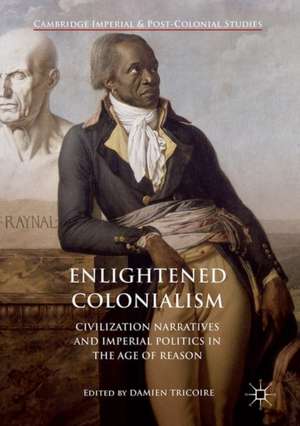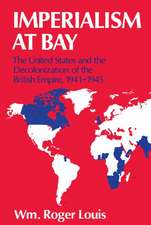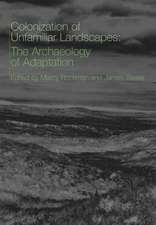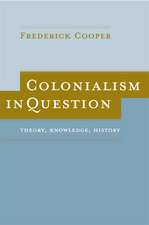Enlightened Colonialism: Civilization Narratives and Imperial Politics in the Age of Reason: Cambridge Imperial and Post-Colonial Studies
Editat de Damien Tricoireen Limba Engleză Hardback – 23 aug 2017
Has Enlightenment provided the cultural and intellectual origins of modern colonialism? For decades, historians of political thought, philosophy, and literature have debated this question. On one side, many postcolonial authors believe that enlightened rationalism helped delegitimize non-European cultures. On the other side, some historians of ideas and literature are willing to defend at least some eighteenth-century philosophers whom they consider to have been “anti-colonialists”. Surprisingly enough, both sides have focused on literary and philosophical texts, but have rarely taken political and social practice into account.
| Toate formatele și edițiile | Preț | Express |
|---|---|---|
| Paperback (1) | 741.77 lei 39-44 zile | |
| Springer International Publishing – 3 aug 2018 | 741.77 lei 39-44 zile | |
| Hardback (1) | 785.55 lei 6-8 săpt. | |
| Springer International Publishing – 23 aug 2017 | 785.55 lei 6-8 săpt. |
Din seria Cambridge Imperial and Post-Colonial Studies
-
 Preț: 397.09 lei
Preț: 397.09 lei - 20%
 Preț: 755.49 lei
Preț: 755.49 lei - 23%
 Preț: 642.53 lei
Preț: 642.53 lei -
 Preț: 196.85 lei
Preț: 196.85 lei -
 Preț: 381.21 lei
Preț: 381.21 lei - 17%
 Preț: 491.70 lei
Preț: 491.70 lei - 18%
 Preț: 894.46 lei
Preț: 894.46 lei - 18%
 Preț: 774.83 lei
Preț: 774.83 lei -
 Preț: 280.10 lei
Preț: 280.10 lei - 18%
 Preț: 733.78 lei
Preț: 733.78 lei - 9%
 Preț: 625.46 lei
Preț: 625.46 lei -
 Preț: 386.11 lei
Preț: 386.11 lei - 18%
 Preț: 782.87 lei
Preț: 782.87 lei -
 Preț: 389.70 lei
Preț: 389.70 lei - 15%
 Preț: 644.18 lei
Preț: 644.18 lei - 15%
 Preț: 500.73 lei
Preț: 500.73 lei - 15%
 Preț: 640.37 lei
Preț: 640.37 lei -
 Preț: 396.40 lei
Preț: 396.40 lei -
 Preț: 390.63 lei
Preț: 390.63 lei - 15%
 Preț: 642.03 lei
Preț: 642.03 lei -
 Preț: 387.96 lei
Preț: 387.96 lei -
 Preț: 385.47 lei
Preț: 385.47 lei - 15%
 Preț: 640.37 lei
Preț: 640.37 lei -
 Preț: 390.63 lei
Preț: 390.63 lei -
 Preț: 389.88 lei
Preț: 389.88 lei -
 Preț: 385.08 lei
Preț: 385.08 lei -
 Preț: 393.52 lei
Preț: 393.52 lei -
 Preț: 390.63 lei
Preț: 390.63 lei -
 Preț: 491.01 lei
Preț: 491.01 lei - 18%
 Preț: 1000.56 lei
Preț: 1000.56 lei - 15%
 Preț: 643.34 lei
Preț: 643.34 lei -
 Preț: 390.63 lei
Preț: 390.63 lei - 15%
 Preț: 699.93 lei
Preț: 699.93 lei -
 Preț: 384.70 lei
Preț: 384.70 lei - 18%
 Preț: 894.46 lei
Preț: 894.46 lei - 15%
 Preț: 645.79 lei
Preț: 645.79 lei - 15%
 Preț: 693.71 lei
Preț: 693.71 lei -
 Preț: 384.31 lei
Preț: 384.31 lei - 15%
 Preț: 641.20 lei
Preț: 641.20 lei -
 Preț: 394.51 lei
Preț: 394.51 lei -
 Preț: 382.36 lei
Preț: 382.36 lei -
 Preț: 395.47 lei
Preț: 395.47 lei - 18%
 Preț: 1004.48 lei
Preț: 1004.48 lei - 15%
 Preț: 648.89 lei
Preț: 648.89 lei
Preț: 785.55 lei
Preț vechi: 957.99 lei
-18% Nou
Puncte Express: 1178
Preț estimativ în valută:
150.32€ • 160.74$ • 125.33£
150.32€ • 160.74$ • 125.33£
Carte tipărită la comandă
Livrare economică 17 aprilie-01 mai
Preluare comenzi: 021 569.72.76
Specificații
ISBN-13: 9783319542799
ISBN-10: 3319542796
Pagini: 248
Ilustrații: XI, 318 p. 1 illus.
Dimensiuni: 148 x 210 mm
Greutate: 0.54 kg
Ediția:1st ed. 2017
Editura: Springer International Publishing
Colecția Palgrave Macmillan
Seria Cambridge Imperial and Post-Colonial Studies
Locul publicării:Cham, Switzerland
ISBN-10: 3319542796
Pagini: 248
Ilustrații: XI, 318 p. 1 illus.
Dimensiuni: 148 x 210 mm
Greutate: 0.54 kg
Ediția:1st ed. 2017
Editura: Springer International Publishing
Colecția Palgrave Macmillan
Seria Cambridge Imperial and Post-Colonial Studies
Locul publicării:Cham, Switzerland
Cuprins
Chapter 1: Introduction; Damien Tricoire.- Part I The Invention of Enlightenment and the Return of Assimilationist Policy.- Chapter 2: The Enlightenment and the Politics of Civilization: Self-colonization, Catholicism, and Assimilationism in Eighteenth-century France; Damien Tricoire.- Chapter 3: Enlightened Colonialism? French Assimilationism, Silencing, and Colonial Fantasy on Madagascar; Damien Tricoire.- Part II From Civilizing to Assimilationist Policy.- Chapter 4: Portuguese Indigenous Policy and Indigenous Policies in the Age of Enlightenment: Assimilationist Ideals and the Preservation of Indigenous Identities; Maria Regina Celestino de Almeida.- Chapter 5: New Forms of Colonialism on the Frontiers of Hispanic America: Assimilationist Projects and Economic Disputes (Río de la Plata, late 18th century); Lía Quarleri.- Part III The Invention of Intra-European Colonialism.- Chapter 6: Civilizing Strategies and the Beginning of Colonial Policy in the Eighteenth-century Russian Empire; Ricarda Vulpius.- Chapter 7: Creating Differences for Integration: Enlightened Reforms and the Civilizing Mission in the Eastern European Possessions of the Habsburg monarchy (1750-1815); Klemens Kaps.- Part IV Towards Civilizing Policy in the British Empire.- Chapter 8: “Gradually Reclaiming Them from a State of Barbarism”: Emergence of and Ambivalence in the Aboriginal Civilization Project in Canada (1815-1857); Alain Beaulieu.- Chapter 9: Europe in an Indian mirror: Comparing Conceptions of Civil Government in Abu Taleb’s Travels (1810); Sven Trakulhun.- Part V Civilization, Racial Order, and Slavery.- Chapter 10: Jean-François de Saint-Lambert and His Moral conte “Ziméo” (1769) inthe Context of Abolitionist and Imperial Activities; Anja Bandau.- Chapter 11: Slavery and the Enlightenment in Jamaica and the British Empire, 1760-1772: the Afterlife of Tacky’s Rebellion and the Origins of British Abolitionism; Trevor Burnard.- Chapter 12: France, the Abolition of Slavery, and Abolitionisms in the Eighteenth Century; Matthias Middell.- Chapter 13: Colonial Enlightenment and the French Revolution: Julien Raimond and Milscent Créole; Jeremy D. Popkin.- Chapter 14: Black Athena in Haiti: Universal History, Civilization, and the Pre-History of Negritude in the Kingdom of Henry Christophe; Doris L. Garraway.
Notă biografică
Damien Tricoire is Assistant Professor at the Martin Luther University Halle-Wittenberg, Germany. He has published the following monographs: Mit Gott rechnen (2013; translated into French as La Vierge et le Roi, 2017), Falsche Freunde (2015, criticizing narratives of Enlightenment history). He has just completed a monograph on the topic “The Colonial Dream: Knowledge, Enlightenment, and the French-Malagasy Early Modern Encounters”.
Textul de pe ultima copertă
This book further qualifies the postcolonial thesis and shows its limits. To reach these goals, it links text analysis and political history on a global comparative scale. Focusing on imperial agents, their narratives of progress, and their political aims and strategies, it asks whether Enlightenment gave birth to a new colonialism between 1760 and 1820.
Has Enlightenment provided the cultural and intellectual origins of modern colonialism? For decades, historians of political thought, philosophy, and literature have debated this question. On one side, many postcolonial authors believe that enlightened rationalism helped delegitimize non-European cultures. On the other side, some historians of ideas and literature are willing to defend at least some eighteenth-century philosophers whom they consider to have been “anti-colonialists”. Surprisingly enough, both sides have focused on literary and philosophical texts, but have rarely taken political and social practice into account.
Has Enlightenment provided the cultural and intellectual origins of modern colonialism? For decades, historians of political thought, philosophy, and literature have debated this question. On one side, many postcolonial authors believe that enlightened rationalism helped delegitimize non-European cultures. On the other side, some historians of ideas and literature are willing to defend at least some eighteenth-century philosophers whom they consider to have been “anti-colonialists”. Surprisingly enough, both sides have focused on literary and philosophical texts, but have rarely taken political and social practice into account.
Caracteristici
Expands the debate on whether Enlightenment provided the cultural and intellectual origins of modern colonialism by exploring political and social practices Brings together studies about the overseas empires of Britain, France, Spain, and Portugal as well as the continental empires of Russia and Austria Explores the interaction and assimilationism between European, indigenous, creole, and mix-raced elites














